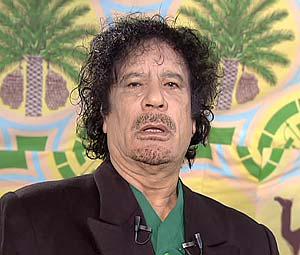UPDATES
A Trial for Gaddafi?
July 1, 2011 | Tzvi Fleischer

Earlier this week, the International Criminal Court (ICC) in The Hague issued an arrest warrant for embattled Libyan dictator Muammar Gaddafi and two close associates.
A number of commentators have noted that this could potentially be counter-productive to the goal of ending the war in Libya quickly. For instance, American strategic expert Max Boot asked:
…what purpose does it serve now to issue these indictments? Is the ICC planning to send an army of international lawyers to Tripoli to arrest Qaddafi and bring him back for trial in the Hague?
He goes on to argue that there needs to be a mechanism, perhaps through the UN Security Council, to offer immunity from prosecution to dictators if it might facilitate getting them to relinquish power or end bloody conflicts, saying:
In the case of Libya, a grant of immunity could be just the ticket to convince Qaddafi to leave power. Failing that, he is likely to fight to the death, taking more lives with him to the grave.
Similarly, the editors of the Wall Street Journal pointed out:
Gadhafi was never likely to accept a quiet exile even if one were offered, but the referral to the ICC followed by the indictment has made that possibility even more remote. In that sense the court works against the cause of peaceful exile for dictators.
I wrote something along similar lines in a column in the April edition of the Australia/Israel Review when Gaddafi was first referred to the ICC. In it, I also offered some thoughts on why potentially counter-productive actions like this one are taken. I wrote:
Why was this well-meaning but counter-productive decision made? I would argue because of the seductions of international law. People imagine international law is the ideal solution to international problems. After all, the rule of law works great domestically. So let’s get international law to prohibit people doing bad things, and prosecute those that do, and this will at least drastically curtail people doing those things. And then we won’t need wars or sanctions or other morally troubling actions.
Only international law… is different. It does not contain the elements of the “rule of law” we experience in Australia or other democracies. There are no police, there is no legislature, there are only limited and contested judicial authorities to interpret the law, and there are no checks and balances on its application.
I went on to note that the result of these differences isto create different and perverse incentives which do not apply in domestic law:
The ICC may investigate Gaddafi, but has no means to arrest and try him as long as he rules Libya. So his incentive was not to stop doing things which might lead to his prosecution – such as killing his political opponents – but to keep doing so as a means to avoid being deposed and thus subject to arrest.
I believe all of what I wrote remains pretty relevant. For readers who haven’t seen it, the whole piece is available here.
Tags: International Security





